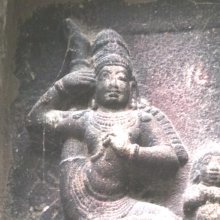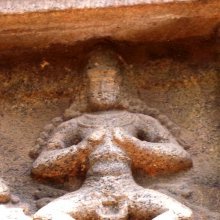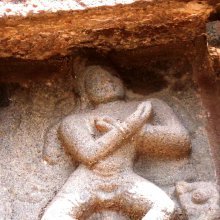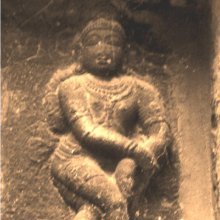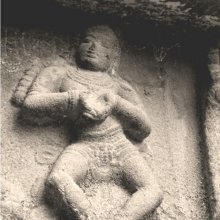Pataka, Patākā, Paṭāka, Patāka, Pātaka, Pāṭaka, Paṭaka, Paṭākā: 36 definitions
Introduction:
Pataka means something in Buddhism, Pali, Hinduism, Sanskrit, the history of ancient India, Marathi, Hindi, biology, Tamil. If you want to know the exact meaning, history, etymology or English translation of this term then check out the descriptions on this page. Add your comment or reference to a book if you want to contribute to this summary article.
Pataka has 35 English definitions available.
Alternative spellings of this word include Patak.
Images (photo gallery)
(+20 more images available)
Languages of India and abroad
Sanskrit dictionary
[Deutsch Wörterbuch]
Source: Cologne Digital Sanskrit Dictionaries: Böhtlingk and Roth Grosses Petersburger WörterbuchPaṭaka (पटक):—m.
1) Baumwollenzeug [Vyutpatti oder Mahāvyutpatti 212.] —
2) Lager (śivira) [Śabdamālā im Śabdakalpadruma] = grāmārdha [Hemacandra’s Abhidhānacintāmaṇi 962, v. l.] für pāṭaka .
--- OR ---
Paṭāka (पटाक):—
1) m. parox. Vogel [UJJVAL.] zu [Uṇādisūtra 4, 14]; vgl. paiṭāka . —
2) f. ā = patākā [Hemacandra’s Abhidhānacintāmaṇi 750,] [Scholiast] [Śabdaratnāvalī im Śabdakalpadruma]
--- OR ---
Pataka (पतक):—
1) adj. (von 1. pat) fallend u.s.w. —
2) m. eine astronomische Tafel [Wilson’s Wörterbuch]
--- OR ---
Patāka (पताक):—(wie eben)
1) m. a) = patākā a. [ADBH. BR.] in [Weber’s Indische Studien 1, 41, 14.] Viell. nur fehlerhaft, da ebend. [39, 2 v. u.] die Form patākā erscheint. — b) eine best. Stellung der Hand oder der Finger der Hand [Oxforder Handschriften 86,a,26. 202,a,1.] Vgl. tripatākā und tripatākākara [DAŚAR. 1, 59.] —
2) f. ā parox. [UJJVAL.] zu [Uṇādisūtra 4, 14.] a) Flagge, Fahne, Wimpel, Banner [Amarakoṣa 2, 8, 2, 67.] [Trikāṇḍaśeṣa 2, 8, 57.] [Hemacandra’s Abhidhānacintāmaṇi 750.] [Anekārthasaṃgraha 3, 61] (= dhvaja, ketu, aṅka). [Medinīkoṣa k. 114.] [Halāyudha 2, 303.] [UJJVAL.] patākā dhvajadaṇḍa ityeke [Hemacandra’s Abhidhānacintāmaṇi 750,] [Scholiast] gaṇa vrīhyādi zu [Pāṇini’s acht Bücher 5, 2, 116.] [ADBH. BR.] in [Weber’s Indische Studien 1, 39, 2 v. u.] nagaraṃ patākādhvajamālinam [Mahābhārata 3, 3014.] vāteritā patākeva [8646. 7, 3930.] alaṃcakruḥ nāgasāhvayam . patākābhirvicitrābhirdhvajaiśca vividhairapi .. [14, 2047.] daṇḍeṣu [2447.] patākābhiralaṃkṛtaḥ (senāyāḥ panthāḥ) [Rāmāyaṇa 2, 80, 13.] [Suśruta 2, 284, 11. 385, 17.] [Varāhamihira’s Bṛhajjātaka S. 24, 9. 35, 5. 42 (43), 25. 47, 33. 59, 2.] patākāṃśukapaṅktibhiḥ [Geschichte des Vidūṣaka 53.] dhūyantāṃ saudhamūrdhasu patākāḥ [Prabodhacandrodaja 26, 8.] sapatāka (ratha) [Mahābhārata 13, 2784.] uttoraṇapatākā adj. [Kathāsaritsāgara 10, 210.] kīrtibhūtāṃ patākāṃ yo loke bhrāmayitā prabhuḥ [Rāmāyaṇa 2, 44, 7.] yaśaḥpatākāṃ vipulāṃ triṣu lokeṣu viśrutām . ucchritya te gataḥ putraḥ [Rāmāyaṇa Gorresio 2, 64, 9.] śauryaikapatākāmiva tāṃ sutām [Geschichte des Vidūṣaka 276.] Inschr. in [Journ. of the Am. Or. S. 6, 506, Śloka 22.] Vgl. utpatāka, utpatākā, niṣpatāka . — b) eine best. grosse Zahl: koṭīsahasraṃ varṣāṇāṃ trīṇi koṭiśatāni ca . padmānyaṣṭādaśa tathā patāke dve tathaiva ca .. [Mahābhārata 13, 5234. 5267.] — c) in der Dramatik ein Zwischenfall, eine Episode [Hemacandra’s Anekārthasaṃgraha] [Medinīkoṣa] [DAŚAR. 1, 13. 33.] nāyaka [2, 7.] — d) Glück, Wohlfahrt; = saubhāgya [Trikāṇḍaśeṣa 3, 3, 29.] [Hemacandra’s Anekārthasaṃgraha] [Medinīkoṣa] — e) Titel eines Buches [Mallinātha] in [Oxforder Handschriften 126,a.]
--- OR ---
Pāṭaka (पाटक):—(wie eben) m.
1) nom. ag. Spalter, Zerreisser: ahaṃ tamo ghanībhūtamahameva ca pāṭakaḥ [Harivaṃśa] [?9767; vgl. 9758.] —
2) die Hälfte eines Dorfes, Theil eines Dorfes, eine Art von Dorf; = grāmārdha [Hemacandra’s Abhidhānacintāmaṇi 962.] = grāmaikadeśa [Hemacandra’s Anekārthasaṃgraha 3, 62.] = kaṭakāntara [Medinīkoṣa k. 115.] Vgl. makara . —
3) Ufer [Hemacandra’s Anekārthasaṃgraha] [Medinīkoṣa] puṣkariṇyāḥ pāṭakaḥ = koṭṭāra [Hemacandra’s Anekārthasaṃgraha 3, 546.] [Medinīkoṣa r. 145.] [Hārāvalī 231.] die zum Wasser führende Treppe nach [Wilson’s Wörterbuch] —
4) ein best. musikalisches Instrument. —
5) eine grosse Spanne (mahākiṣku). —
6) Abnahme des Kapitals [Hemacandra’s Anekārthasaṃgraha 3, 62. fg.] [Medinīkoṣa k. 115. fg.] —
7) das Werfen der Würfel u.s.w., = akṣādipātaka (wohl pātana zu lesen) [Hemacandra’s Anekārthasaṃgraha] = akṣādicolana (lies mit [Śabdakalpadruma] cālana) [Medinīkoṣa] — Vgl. akṣa .
--- OR ---
Pātaka (पातक):—(vom caus. von 1. pat)
1) adj. zu Fall bringend: s. garbha . —
2) m. n. [Amarakoṣa 3, 6, 4, 33.] Verbrechen [Trikāṇḍaśeṣa 1, 1, 112.] [Hemacandra’s Abhidhānacintāmaṇi 1380.] [Halāyudha 3, 5.] [Yāska’s Nirukta 6, 27] (eingeschobene und verdorbene Stelle). yaḥ sakṛtpātakaṃ (pāpakaṃ [Aitareyabrāhmaṇa]) kuryāt [Śāṅkhāyana’s Śrautasūtrāṇi 15, 24, 10.] anyatrābhakṣyapātakebhyaḥ [GṚHY. 1, 12.] [Manu’s Gesetzbuch 8, 88. 112. 113. 10, 126.] brahmahatyā surāpānaṃ steyaṃ gurvaṅganāgamaḥ . mahānti pātakānyāhuḥ saṃsargaścāpi taiḥ saha .. [11, 54. 258. 259.] [Yājñavalkya’s Gesetzbuch 2, 96. 3, 284.] [Bhagavadgītā 1, 38.] [Mahābhārata 1, 4203] (wo pātakaṃ . st. pātakāṃ zu lesen ist). [?4334. 13, 2424 (masc.). Bhartṛhari 2, 45. Spr. 197. Raghuvaṃśa 9, 82. Varāhamihira’s Bṛhajjātaka S. 9, 25. Hitopadeśa I, 62. Kathāsaritsāgara 30, 126. Vetālapañcaviṃśati in Lassen’s Anthologie 28, 2.] am Ende eines adj. comp. f. ā [Spr. 987.] atipātaka [Mahābhārata 13, 3215.] — Vgl. ati, anu, upa, mahā .
--- OR ---
Patāka (पताक):—
2) c) [Sāhityadarpana 317. 320. fg.]
--- OR ---
Pātaka (पातक):—
2) karma eine sündhafte That [Rāmāyaṇa 2, 109, 21 (118, 21 Gorresio).]
Source: Cologne Digital Sanskrit Dictionaries: Sanskrit-Wörterbuch in kürzerer FassungPaṭaka (पटक):—m. —
1) Baumwollenzeug. —
2) ein fürstliches Lager , Lagerzelt. —
3) die Hälfte eines Dorfes.
--- OR ---
Paṭāka (पटाक):——
1) m. Vogel. —
2) f. ā Fahne.
--- OR ---
Pataka (पतक):——
1) Adj. fallend u.s.w. —
2) m. eine astronomische Tafel.
--- OR ---
Patāka (पताक):——
1) m. — a) = 2. a). Verdächtig. — b) eine best. Stellung der Hand oder der Finger der Hand. —
2) f. ā — a) Flagge , Fahne , Wimpel , , Banner. in Comp. mit dem , was die Fahne verkünden soll. patākāṃ labh so v.a. die Palme erringen unter (Loc.) [Vikramāṅkadevacarita 9,22.] Am Ende eines adj. Comp. f. ā. — b) eine best. hohe Zahl. = mahāpadma [Nīlakaṇṭha] — c) in der Dramatik ein Zwischenfall , eine Episode. — d) *Wohlfahrt. — e) Titel eines Werkes.
--- OR ---
Pāṭaka (पाटक):——
1) m. — a) Spalter , Zerreisser. — b) *die Hälfte eines Dorfes , Theil eines Dorfes oder eine Art Dorf. — c) *Ufer — d) *eine zu einem Wasser führende Treppe. — e) *eine best. musikalisches Instrument. — f) *eine grosse Spanne. — g) *Abnahme des Kapitals. — h) *das Werfen von Würfeln u.s.w. —
2) f. pāṭikā in dina (Nachtr. 3).
--- OR ---
Pātaka (पातक):——
1) Adj. zu Fall bringend in garbha —
2) m. (ausnahmsweise) und n. (adj. Comp. f. ā) ein zur Verlust der Kaste führendes Verbrechen. [Gautama's Dharmaśāstra 21,2.10.]
Sanskrit, also spelled संस्कृतम् (saṃskṛtam), is an ancient language of India commonly seen as the grandmother of the Indo-European language family (even English!). Closely allied with Prakrit and Pali, Sanskrit is more exhaustive in both grammar and terms and has the most extensive collection of literature in the world, greatly surpassing its sister-languages Greek and Latin.
See also (Relevant definitions)
Starts with (+23): Pataka Hasta, Patakadanda, Patakadarshana, Patakadhvajamalin, Patakahasta, Patakai, Patakaicottikam, Patakakara, Patakam, Patakamshuka, Patakana, Patakancol, Patakanem, Patakani, Patakanikkai, Patakanirasa, Patakanni, Patakapata, Patakapataka, Patakappalai.
Ends with (+82): Adhipataka, Ahipataka, Ajnatapataka, Akshapataka, Anekantajayapataka, Anupataka, Apataka, Ardha-pataka, Ashrupataka, Atipataka, Bhrunahatyapataka, Bhumipappataka, Bhumiparpataka, Bhuparpataka, Carpataka, Challipataka, Charpataka, Chhallipataka, Cotapataka, Darmapataka.
Full-text (+324): Padaga, Padaka, Payaya, Patakam, Atipataka, Anupataka, Upapataka, Patakayoga, Patakamshuka, Utpataka, Akshapataka, Patakin, Patakasthanaka, Patakya, Mayurapatakam, Nipataka, Arthaprakriti, Padaya, Vipataka, Nitpataka.
Relevant text
Search found 60 books and stories containing Pataka, Padaagaa, Padaga, Padaka, Pataaka, Pataakaa, Patākā, Paṭāka, Patāka, Pātaka, Pāṭaka, Paṭakā, Paṭaka, Paṭākā; (plurals include: Patakas, Padaagaas, Padagas, Padakas, Pataakas, Pataakaas, Patākās, Paṭākas, Patākas, Pātakas, Pāṭakas, Paṭakās, Paṭakas, Paṭākās). You can also click to the full overview containing English textual excerpts. Below are direct links for the most relevant articles:
Garga Samhita (English) (by Danavir Goswami)
Verse 3.1.30 < [Chapter 1 - The Worship of Śrī Girirāja]
Verse 6.16.35 < [Chapter 16 - Seeing Śrī Rādhā’s Form]
Verse 4.20.3 < [Chapter 20 - The Killing of Pralamba]
Hanuman Nataka (critical study) (by Nurima Yeasmin)
Manusmriti with the Commentary of Medhatithi (by Ganganatha Jha)
Verse 10.126 < [Section XIV - Sources of Income (vittāgama)]
Verse 11.54 < [Section VI - Offences: their Classification]
Verse 8.112 < [Section XVIII - Oaths and Ordeals]
Abhinaya-darpana (English) (by Ananda Coomaraswamy)
Chapter 26 - Hands denoting Animals
Chapter 23 - Hands denoting Famous Rivers
Puranic encyclopaedia (by Vettam Mani)
Sahitya-kaumudi by Baladeva Vidyabhushana (by Gaurapada Dāsa)
Text 7.25 < [Chapter 7 - Literary Faults]
Related products
